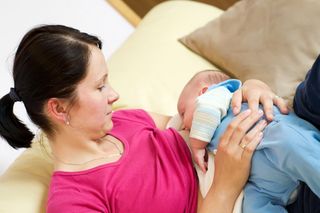Breast Milk May Hint at Breast Cancer Risk

A woman's breast milk may provide clues to her risk for developing breast cancer, a new study suggests.
The study examined DNA from specific cells present in breast milk. The researchers found there were more DNA modifications on certain genes inside these cells in breast tissue that turned cancerous compared to healthy tissue.
While the results are preliminary and need to be replicated in a larger group of women, they suggest breast milk might one day serve as a screening tool to assess breast cancer risk, the researchers say. About 80 percent of women give birth and could take such a test.
The test would be particularly useful for women who become pregnant later in life because they are at a higher risk for breast cancer, said study researcher Kathleen Arcaro, an associate professor of veterinary and animal sciences at the University of Massachusetts Amherst.
There are currently no good methods for screening pregnant women for breast cancer, Arcaro said. Mammograms do not detect breast cancer well in lactating women, she said.
The results of the study will be presented today (April 4) at the American Association for Cancer Research Annual Meeting in Orlando, Fla.
Breast milk for breast cancer screening
Sign up for the Live Science daily newsletter now
Get the world’s most fascinating discoveries delivered straight to your inbox.
Arcaro and her colleagues collected breast milk from about 250 women who had had a breast biopsy to check for potential problems. Some of these women turned out to have cancer, while others did not.
The women provided milk samples from both their biopsied and non-biopsied breasts.
The researchers first isolated epithelial cells from the breast milk. These are cells that line the mammary glands and are where breast cancer would likely develop.
The researchers then examined DNA inside these cells to look for modifications known as methylation. If these modifications are on a certain part of the gene, they can turn the gene on or off, potentially increasing the risk for cancer. The researchers specifically analyzed three genes: RASSF1, GSTP1 and SFRP1. Methylation on these genes is known to be linked to an increased risk of breast cancer.
They saw that, among women who were found to have breast cancer, the DNA from the biopsied breast had more methylation on the RASSF1 gene than the DNA from the non-biopsied breast. This result tells researchers "there's something different going on in the cells that came from that breast that developed cancer," Arcaro said.
In addition, among all the participants, there was more methylation on the SFRP1 gene in the biopsied breast compared with the non-biopsied breast.
Future work
The researchers are continuing to follow the participants to see if any additional cancer cases develop.
They would also like to examine more genes, Arcaro said. A screening test would need to examine DNA modifications on a number of genes in order to accurately predict a women's breast cancer risk.
Breast milk has advantages over some previous methods for studying breast cancer risk: it allows researchers to collect cells from inside patients' breasts in a manner that is noninvasive and provides a large number of cells, Arcaro said.
The study was funded by the Congressionally Directed Medical Research Program and the Avon Foundation.
Pass it on: Researchers may one day be able to screen breast milk to assess a woman's breast cancer risk.
Follow MyHealthNewsDaily staff writer Rachael Rettner on Twitter @RachaelRettner.
This story was provided by MyHealthNewsDaily, a sister site to LiveScience.

Rachael is a Live Science contributor, and was a former channel editor and senior writer for Live Science between 2010 and 2022. She has a master's degree in journalism from New York University's Science, Health and Environmental Reporting Program. She also holds a B.S. in molecular biology and an M.S. in biology from the University of California, San Diego. Her work has appeared in Scienceline, The Washington Post and Scientific American.
